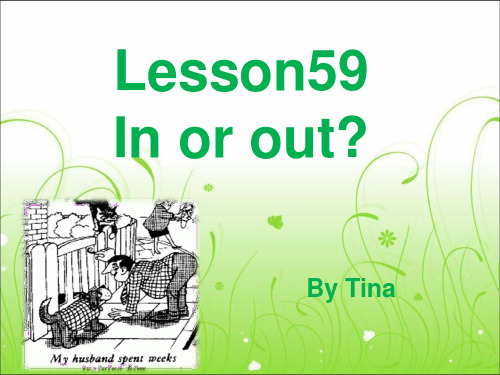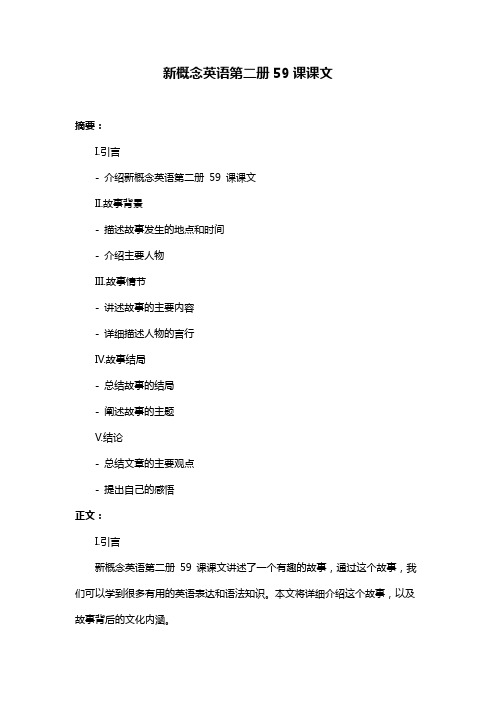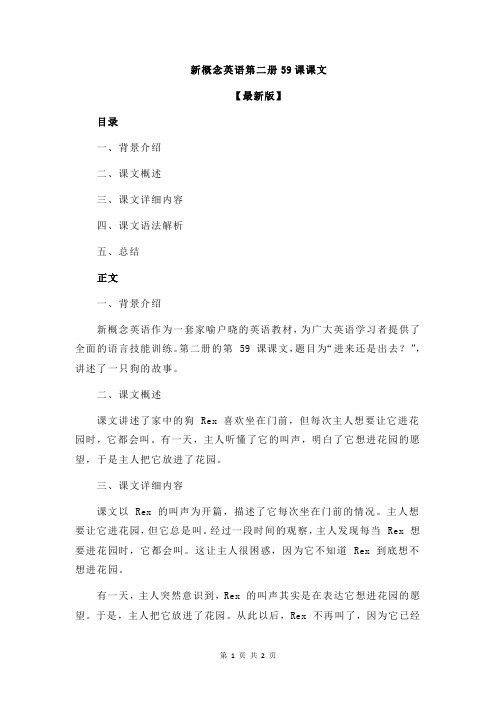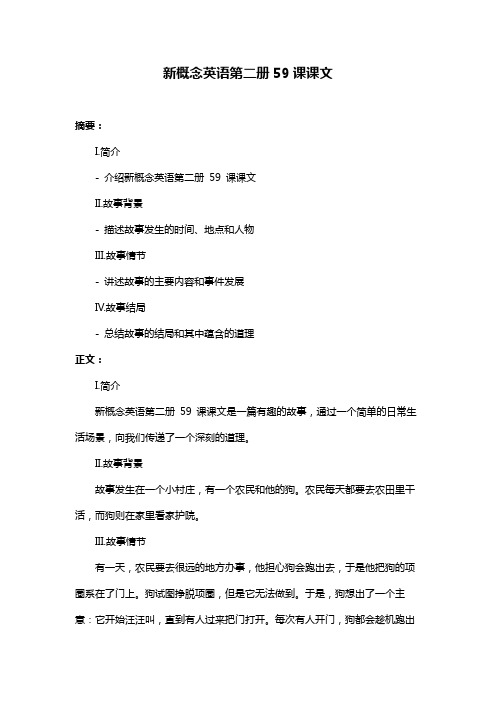新概念英语教案第二册59课
新概念英语第二册Lesson59

Language points
• 1 Where did Rex use to sit ? A. outside the front door B. inside the front door C. outside the back door • 2 What did the neighbour complain of ? A. The voice B. The sound C. The noise 3. After my husband removed the gate , how did Rex feel? A. Rex felt happy. B. Rex got annoyed C. Rex was excited.
latch
• on the latch 仅上门闩的,关着的,未 上锁的 • off the latch 未上门闩的,虚掩的 2)v. 用门闩栓牢或用撞锁锁住 你离开的时候别忘了把前门锁上。 • Don’t forget to latch the front door when you leave.
★remove v. 拆掉, 取下 • remove the dishes 撤去碗碟 • remove one’s hat 脱掉帽子 • My husband removed the gate. 拆门 • The player was removed from the team. 开除
remove
Our dog, Rex, used to sit outside our front gate and bark. Every time he wanted to come into the garden he would bark until someone opened the gate. As the neighbours complained of the noise, my husband spent weeks training him to press his paw on the latch to let himself in. Rex soon became an expert at opening the gate. However, when I was going out shopping last week, I noticed him in the garden near the gate.
新概念英语第二册59课课文

新概念英语第二册59课课文摘要:I.引言- 介绍新概念英语第二册59 课课文II.故事背景- 描述故事发生的地点和时间- 介绍主要人物III.故事情节- 讲述故事的主要内容- 详细描述人物的言行IV.故事结局- 总结故事的结局- 阐述故事的主题V.结论- 总结文章的主要观点- 提出自己的感悟正文:I.引言新概念英语第二册59 课课文讲述了一个有趣的故事,通过这个故事,我们可以学到很多有用的英语表达和语法知识。
本文将详细介绍这个故事,以及故事背后的文化内涵。
II.故事背景故事发生在一个小镇上,时间是早晨。
主要人物包括一个年轻女孩(the girl)和一个卖冰淇淋的男子(the man)。
III.故事情节女孩走在去学校的路上,看到一个卖冰淇淋的男子。
女孩想吃冰淇淋,但是她的零花钱不够。
于是,女孩向卖冰淇淋的男子询问价格。
男子告诉她,冰淇淋的价格是30 便士。
女孩只有20 便士,于是她向男子表示她的钱不够。
然而,男子却表示,如果女孩愿意,他可以以20 便士的价格卖给她冰淇淋。
女孩感到很高兴,但她没有立刻答应。
她告诉男子,她需要考虑一下。
女孩走在回家的路上,心里想着冰淇淋的美味。
她决定回头去找那个卖冰淇淋的男子,买下那支冰淇淋。
当她回到男子身边时,却发现他已经离开了。
女孩感到非常失望,她意识到自己错过了一次机会。
IV.故事结局故事以女孩错过买冰淇淋的机会为结局。
这个结局告诉我们,有时候,机会就在我们面前,但我们需要抓住它,否则就会错过。
故事的主题是珍惜眼前的机会,不要犹豫不决。
V.结论通过这个故事,我们可以学到很多有用的英语表达和语法知识。
同时,故事也告诉我们,珍惜眼前的机会很重要。
新概念英语第二册 Leason 59

西方狗文化
• 西方世界,享有“Man’s best friend ”的狗,在西方具体 文化表现中也大多数突显了其较高的地位。
• 第一,用“dog”来形容人,常常表示对一些人的赞扬, 信任,这在汉语中是从未出现的。如a lucky dog(幸运 儿)、a big dog(大款,保镖等)、a top dog(一个身居 要职的人)。 • 第二 ,在西方,人们养狗的方式也与西方大相径庭。在 一些英美国家,人绝不让狗吃人剩下的残羹冷炙,狗有专 门的狗食。在超市, 狗食与人的食品放在一起销售,还 有一些专门为狗提供服务的设施和商店,如:狗食店、狗 餐厅、狗医院、狗旅社等。另外,还有专门为狗树碑立传、 歌功颂德的。因此,狗成了他们的朋友,受到与人平等的 尊重。
Language points
However, when I was going out shopping last week, I noticed him in the garden near the gate.
going out shopping 加了out 强调外出
Language points
Language points
Every time he wanted to come into the garden he would bark until someone opened the gate. every time=when 每当,每次,无论何时(every time 在这里为连词引导一个时间状语从句,表示“每次”、 “每当”,主句中的would表示过去的习惯性动作。) Every time we met, we would talk for a while. 我们每次见面都要聊一会儿。 He brought a present every time he came to visit us. not… until 直到…才 主句中的动词为非延续性动词 we’ll stay at home until the rain stops. We won’t start until the rain stops.
(推荐)新概念英语第二册Lesson59

Important phrases
过去常常
used to
每当,每次
every time
抱怨,发牢骚
complain of
让...进来/出去
let...in /out
开门的专家
an expert at opening the gate
养成了另外一种坏习惯 developed another bad habit
• Expert常与介词at,in,on,with连用
• John is an expert at driving a car. • 约翰是开车高手。
• She is an expert in flowers. • 她是花卉方面的专家。
• Sam is an expert on that problem. • 萨姆是研究那个问题的权威。
when you leave.
★expert n. 专家 • expert at/in sth. 在某一方面是专家 • expert at/in doing sth. • He is an expert in maths.
• become an expert at doing sth. 成了……能 手/专家/权威
expert adj.熟练地,老练的,擅长的
• an expert economist 一个老练的经济学家
• an expert thief 一个熟练的贼
be expert at sth/ doing sth
be expert in sth/ doing sth
• 她对付孩子非常擅长。
擅长….
• She is expert at handling children.
New words and expressions
第59课 新概念英语第二册第59课教案

新概念英语第二册第59课学案Part 1 Words1. bark1) 树皮不可名2) v./n 狗叫3)v. 剥树皮*sb’s bark is worse than his bite刀子嘴豆腐心2. press1) n. 按,压,挤,推*a trouser press 裤子熨平器*the press 出版界,新闻界*press-box 记者席2) n.印刷厂,出版社*Oxford University Press 牛津大学出版社3)v. 按,压,挤,推Eg. press the button 按按钮*pressure n.压力不可名*pressure cooker 高压锅3.expert1) n.专家,能手Eg. an expert at playing golf2) adj 熟练的,老练的Eg. an expert economist*be expert at sthBe expert in doing sthBe expert on sth4. habit n.习惯*fall into the habit of doing sth=get into the habit of doing sth养成……的习惯=develop/form/make a habit*kick the habit of 戒除某习惯=get rid of the babit of5. remove v.移开,挪走,剔除,脱掉Eg. remove one’s hat*remover n.迁移者,搬运工,清除剂*removable adj 可移动的,可除去的,可拆除的*removed adj 隔了……代的Eg. once removed 隔了一代的Twice removed 隔了两代的Part 2 Grammar●一般过去时●一般现在时●现在完成时:have/has done sth●现在完成进行时:have/has been doing*It is said to do sth*It is said that 据说Part 3 Text1. Our dog, Rex, used to sit outside our front gate and bark.*used to do sth 过去常常做某事*outside 外面*outsider 局外人*inside 里面*insider 内部的人,知情人2. As the neighbours complained of the noise, my husband spent weeks training him to press his paw on the latch to let himself in.*complain of 抱怨,诉说*complain to sb about sth 抱怨*spend 时间/金钱(in) doing sht*let sb in/out 让某人进来/出去3. This time he was barking so that someone would let him out.*so that 和in order that 引导的目的状语从句*so as to do sth = in order to do sth 为了做某事4. Yesterday my husband removed the gate and Rex got so annoyed we have not seen him since.=Yesterday my husband removed the gate and Rex got so annoyed that we have not seen him since.*so…that…如此……以至于……。
新概念英语第二册59课课文

新概念英语第二册59课课文
【最新版】
目录
一、背景介绍
二、课文概述
三、课文详细内容
四、课文语法解析
五、总结
正文
一、背景介绍
新概念英语作为一套家喻户晓的英语教材,为广大英语学习者提供了全面的语言技能训练。
第二册的第 59 课课文,题目为“进来还是出去?”,讲述了一只狗的故事。
二、课文概述
课文讲述了家中的狗 Rex 喜欢坐在门前,但每次主人想要让它进花园时,它都会叫。
有一天,主人听懂了它的叫声,明白了它想进花园的愿望,于是主人把它放进了花园。
三、课文详细内容
课文以 Rex 的叫声为开篇,描述了它每次坐在门前的情况。
主人想要让它进花园,但它总是叫。
经过一段时间的观察,主人发现每当 Rex 想要进花园时,它都会叫。
这让主人很困惑,因为它不知道 Rex 到底想不想进花园。
有一天,主人突然意识到,Rex 的叫声其实是在表达它想进花园的愿望。
于是,主人把它放进了花园。
从此以后,Rex 不再叫了,因为它已经
得到了自己想要的。
四、课文语法解析
本课的语法重点是情态动词的用法。
课文中用到了“would”这个情态动词,表示过去常常发生的动作或存在的状态。
“would”也可以表示一种倾向、习惯或特点。
例如,课文中的句子“every time he wanted to come into the garden, he would bark”(每次它想进花园时,它都会叫),表示 Rex 过去常常在想进花园时叫。
五、总结
通过这个故事,我们学会了要细心观察,了解别人的需求。
新概念英语第二册59课课文

新概念英语第二册59课课文
摘要:
I.简介
- 介绍新概念英语第二册59 课课文
II.故事背景
- 描述故事发生的时间、地点和人物
III.故事情节
- 讲述故事的主要内容和事件发展
IV.故事结局
- 总结故事的结局和其中蕴含的道理
正文:
I.简介
新概念英语第二册59 课课文是一篇有趣的故事,通过一个简单的日常生活场景,向我们传递了一个深刻的道理。
II.故事背景
故事发生在一个小村庄,有一个农民和他的狗。
农民每天都要去农田里干活,而狗则在家里看家护院。
III.故事情节
有一天,农民要去很远的地方办事,他担心狗会跑出去,于是他把狗的项圈系在了门上。
狗试图挣脱项圈,但是它无法做到。
于是,狗想出了一个主意:它开始汪汪叫,直到有人过来把门打开。
每次有人开门,狗都会趁机跑出
去,但是它总会被农民抓回来。
IV.故事结局
最后,农民终于明白了狗的心思,他把项圈解开了。
从此,狗再也没有试图跑出去过。
最新新概念2-第59课-课件精品课件

develop a habit form a habit
养成(yǎnɡ chénɡ)… 习
make a habit
我养成(yǎnɡ chénɡ)了一回家就看电视的习惯 。
I’ve got into a habit of turning on the TV as
soon
第十九页,共38页。
habit
______冲___洗__________ zdheev)e--lo-(片的pchm发ōenn展gt:xnǐ).底with the development of: 随着(suí
___________________________________________
_W_,i_t_h__thoeudrecvoeulnotprmy heanstboefcothmeeaairmcorsatfptowerful
我才不想被人利用 。
第十页,共38页。
Key words & expressions
★latch n. 门闩 latch n. 门闩(庭院(tíngyuàn),花园中的门闩
) bar n. 门闩(与 latch不同) You can’t walk in because the door is on the
(cuīcù)。 pressure n. 压, 压力, 电压, 压迫, 强制, 紧迫 pressure cooker 高压锅
第九页,共38页。
Key words & expressions
★paw n. 脚爪 The cat’s paw was burnt. My dog’s paw was bleeding. cat's paw 被利用的人(由寓言(yùyán)而来) I don‘t want to be a cat’s paw.
- 1、下载文档前请自行甄别文档内容的完整性,平台不提供额外的编辑、内容补充、找答案等附加服务。
- 2、"仅部分预览"的文档,不可在线预览部分如存在完整性等问题,可反馈申请退款(可完整预览的文档不适用该条件!)。
- 3、如文档侵犯您的权益,请联系客服反馈,我们会尽快为您处理(人工客服工作时间:9:00-18:30)。
新概念英语教案第二册
59课
-CAL-FENGHAI-(2020YEAR-YICAI)_JINGBIAN
Lesson 59 In or out?
一、教学重点
1、复习书信写作
二、教学步骤
1、引入话题(详见右框)。
2’
2、听一遍音频,掌握大意。
5’
① Why did our dog, Rex, use to sit outside the front gate and bark?
② Did my husband train him to open the gate himself or not?
③ Has my husband removed the gate or not?
3、生词解读,纠正发音。
10’
4、提出问题:Has Rex disappeared or not?
看一遍视频,解答问题。
3’
5、精讲课文,板书和笔记(详见下文)。
20’
1、做275页的两道选择理解题。
5’
2、朗读课文。
10’
3、复习句型(详见下文)。
10’
4、做274页关于句型的练习。
15’
5、绕口令。
10’
【第三节课】
1、讲解274页的难点。
10’
2、听写单词,记忆法指点。
10’
3、听英文歌曲。
8’
4、看图背课文比赛。
20’
5、总结本课重点,让学生标注(详见上文)。
1’
6、布置作业:摘要写作,275页的选择题,背课文和单词。
1’
三、单词讲解
★bark v. 狗叫 The dog is barking.
sb. is barking. 某人在咆哮
The dog barked at the visitor.
★press v. 按, 压
① vt.&vi. 按,挤,压
Can you press that button for me please
②vt. 催促,敦促,竭力劝说
I don’t like to be pressed. 我不喜欢被人催促。
pressure n. 压, 压力, 电压, 压迫, 强制, 紧迫
★paw n. 脚爪
cat's paw 被利用的人(由寓言而来)
I don't want to be a cat's paw我才不想被人利用
The cat’s paw was burnt
My dog’s paw was bleeding.
★latch n. 门闩
latch n. 门闩(庭院,花园中的门闩)
bar n. 门闩(与 latch不同)
You can’t walk in because the door is on the latch.
★expert n. 专家
expert at/in sth. 在某一方面是专家
expert at/in doing sth.
He is an expert in maths.
★develop v. 养成
① vt. &vi. 发展,扩展
The village has developed into a town now.
Ideveloping country 发展中国家; developed country 发达国家
V-ed 强调已经,V-ing 强调正在,有时态的区别
boiling water 滚开水; boiled water 开水
develop the film 冲洗胶卷
★habit n. 习惯(指个人习惯)
custom n. 风俗,习俗; customs n. 海关; customer n. 顾客
develop a good habit
He slipped into bad habits.
He has the habit of staying up late.
★remove v. 拆掉, 取下
remove sth. from 从……挪走
she saw he had reomoved his glasses.
He removed the picture from the wall.
四、课文精讲
1、Our dog, Rex, used to sit outside our front gate and dark.
front gate 前门
would=used to 过去常常
2、Every time he wanted to come into the garden he would bark until someone opened the gate. The dog used to bark the front gate to let(make) somebody open the door.
every time=when 每当,每次,无论何时(every time在这里为连词引导一个时间状语从句,表示“每次”、“每当”,主句中的would表示过去的习惯性动作。
用一般过去时的句子中它们经常连用)
Every time we met, we would talk for a while.
我们每次见面都要聊一会儿。
the monment=as soon as 一……就……(强调的是瞬间)
3、As the neighbours complained of the noise, my husband spent weeks training him to press his paw on the latch to let himself in.
complaim of… 抱怨……
sb. spend time (in) doing sth./on sth. 花费某段时间去做某事(人作主语)Why don’t you spend more time on studies
I spent two weeks (in) reading this book.
It takes sb. some times to do sth. 某事花了某人多少时间(事情做主语)train sb. to do sth. 训练某人做某事
let sb. do sth. 让某人做某事
let sb. in 让某人进来; let sb. out 让某人出去
let sb. down 让某人失望
press his paw on the latch = press the latch
press the button / press the figure on the button
4、Rex soon became an expert at opening the gate.
become an expert at doing sth. 成了……能手/专家/权威
John is an expert at driving a car.
约翰是开车高手。
She is an expert in flowers.
她是花卉方面的专家。
Sam is an expert on that problem.
萨姆是研究那个问题的权威。
5、However, when I was going out shopping last week, I noticed him in the garden near the gate.
going out shopping 加了out 强调外出
6、Yesterday my husband removed the gate and Rex got so annoyed we have not seen him since.
so…that…如此…以至于,结果状语从句,可以省略一个词,so 或 that 都可以so that 以便于……,为了(目的状语从句)
This time he was barking so that someone would let him out!
since(在句尾) = since then : 从那时起到现在为止。
